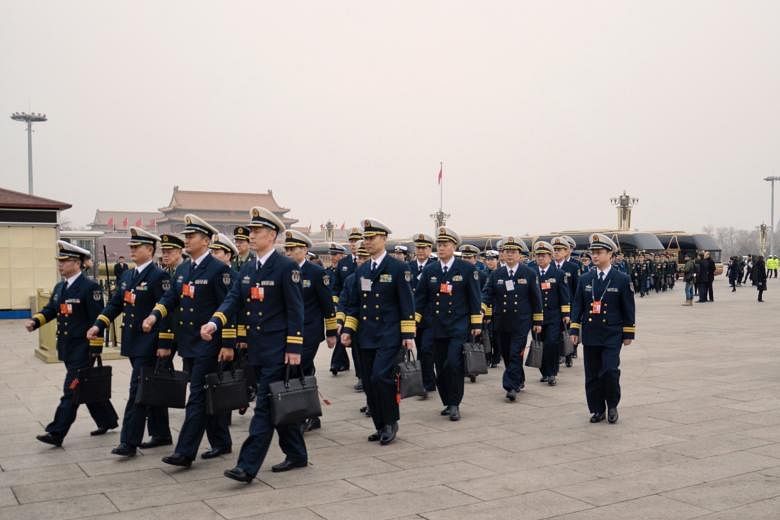BEIJING - In a break with tradition, China on Sunday (March 4) did not reveal how much its defence budget will rise this year.
National People's Congress (NPC) spokesman Zhang Yesui said that China has increased its defence budget in recent years "by a modest margin", but did not reveal a figure of the likely jump in military spending this year.
He was responding to a question on China's defence budget during a press conference held on the eve of the opening of China's top political meeting on Monday (March 5).
China has since at least 2012 used the pre-meeting press conference to release an estimate of the increase in its defence budget, but Mr Zhang did not release a figure this time.
Exact figures for China's military budget are customarily released in the Premier's work report on the opening day of the annual meeting of the National People's Congress.
Premier Li Keqiang did not include the number in his work report at last year's session, an omission that raised questions about China's commitment to transparency.
The figure - a seven-per-cent increase - was released a day later by the official Xinhua news agency.
As China's reach extends to all corners of the world, shifts in Beijing's defence expenditure are closely watched as an indication of its strategic intent.
Mr Zhang acknowledged that China's defence budget is an "old question" that is raised every year.
"If we take a look at the share of China's defence budget as a share of GDP, as part of national fiscal spending, and also in per-capita terms, we can see that China's defence input is still lower than major countries," he said.
China upped its defence spending last year by seven per cent to 1.044 trillion yuan, or about a quarter of US defence spending. This was a slight dip from the 7.6-per-cent increase in 2016.
Since taking office in 2012, President Xi Jinping has launched unprecedented reforms to the command structure of the People's Liberation Army (PLA), as well as oversaw modernisation efforts to ensure the world's largest standing army can fight and win a 21st century war.
Mr Xi was appointed chairman of the Central Military Commission - the supreme military decision-making body - for a second five-year term at the 19th Party Congress last October.
Mr Xi has also tasked the PLA with improving joint operations across its services and raising its capabilities in both domestic and overseas missions.
Mr Zhang said on Sunday that "a large part" of China's defence spending is used to upgrade its hardware capabilities and to improve the training and living conditions of its troops.
"China is committed to a path of peaceful development, and China pursues a defence policy that is defensive in nature," he said.
"China's development will not pose a threat to other countries."


